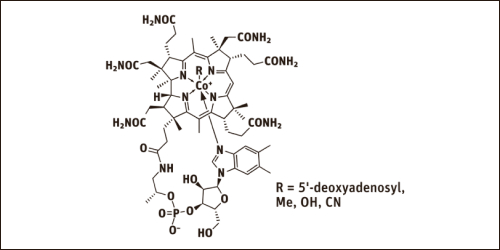Vitamin B12
Cobalamin
Year of discovery: 1926 | George Whipple, George Richards Minot
Vitamin B12 acts as a coenzyme in the conversion of homocysteine to methionine, in the metabolism of fatty acids and amino acids, and in the production of neurotransmitters. It also maintains a special lining that surrounds and protects nerve fibers. Bone cell activity also depends on vitamin B12. Folic acid and vitamin B12 are closely related. Folic acid donates its methyl group to vitamin B12 and activates this vitamin.
Main sources of vitamin B12
Vitamin B12 is found only in foods of animal origin, with the exception of plant products that have been enriched with it. Rich sources of vitamin B12 are shellfish, liver, game (venison and rabbit), some fish (herring, sardines, salmon, trout), milk and dairy products.
Bioavailability of vitamin B12
There is insufficient data on the absorption of vitamin B12. According to experts, about 50% of vitamin B12 is absorbed in adults with a healthy gastrointestinal tract. Impaired absorption occurs when there is not enough acid in the stomach or when the stomach does not produce the protein, which is called intrinsic factor. Conventional heat treatments involving high temperatures (such as microwaves) and long cooking times can cause irreversible loss of some vitamin B12.
Risks associated with insufficient or excessive intake of vitamin B12
It is estimated that about 10-30% of the elderly suffer from chronic gastritis. This is a condition that impairs the absorption of vitamin B12. It is recommended that the elderly consume fortified foods or supplements to meet their vitamin B12 needs. Vegans (i.e., people who do not eat animal foods) who do not take fortified foods or supplements will develop vitamin B12 deficiency. However, it can take several years for such vitamin B12 deficiency to develop, as the body processes most of the vitamin B12 and reabsorbs it. Infants born to vegans are also at risk of deficiency, as long as the mother's vitamin B12 levels were too low during pregnancy. The need for vitamin B12 increases in HIV-infected people with chronic diarrhea. Symptoms of vitamin B12 deficiency include anemia, general fatigue, loss of appetite, gastric atrophy, neuromuscular pain, neurological problems (with gait, memory loss). There have been no reported side effects associated with excessive vitamin B12 intake.




